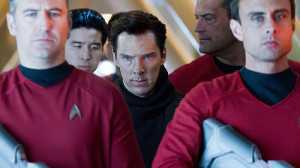And here it is. Another successful film. J.J. Abrams goes from success to success. After Lost, he started Mission Imposibble III. And with his current Star, he's proven a return to his classic sci-fi roots. The Star Trek phenomenon in film form is now 34 years old. In 1979 came the first Star Trek - The Movie, in response to Star Wars. Star Wars maintained its success, unlike Star Trek, which switched to a new crew in 1994, with the 7th installment (Star Trek VII: Generations), and the last film of the new crew was the failed 10th installment, Star Trek X: Nemesis. Until J.J. Abrams was able to bring back the stars of space travel again in 2009.
His return with the original crew of James T. Kirk, Spock, "Bones" and other crew members was a success. By placing the new episodes in an alternate timeline, and keeping the original Star Trek story line solely to Leonard Nimoy, he has once again brought the sci-fi future of planetary travel back to its shine.
The change is especially evident in the modern action concept of all the action and dialogue, which can say a lot of words in a fleeting bullet sequence. The film's subtitlers have a bit more work to do to fit fast-paced American vernacular into limited subtitles.

The action is also very fast-paced compared to the first episodes, and doesn't get boring. J.J. was able to change all that. Abrams to bring Star Trek back to successful waters.
In the first episode, we find ourselves in the history of Captain James T. Kirk, who is just getting to know his great friend Spock. In the second episode, their relationship deepens and their trust in each other deepens as well. Unlike the first episode, which was all about introductions, the second episode is already about a new joint action.
The story begins on a routine mission that doesn't go the way Kirk and Spok imagine it will, thanks to mistakes and a violation of the Prime Directive. For the uninitiated, "Do not reveal the identity or nature of the mission. Do not interfere with the social development of the planet in question. Do not disseminate information about space, other worlds or advanced civilizations." Kirk is suspended and loses his ship. Fortunately for the story, the writers have devised an attack on the museum and the subsequent assassination of the best captains and admirals, and so the complicated story is taken care of.
All the changes from the original Star Trek films go for broke. By having all the story take place in a new alternate timeline, the filmmakers were able to afford new aliens, new planets, new ships, and most importantly, allusions to the original events and characters.
It's a shame, though, that the writers didn't invent a story that Star Trek didn't already know. The most famous villain, Khan Noonien Singh, makes a reappearance. After the very characteristic Ricardo Montalbán, the filmmakers chose a new actor, Benedict Cumberbatch, who managed to continue a very good legacy. Unfortunately, or rather unfortunately, the whole film hinges on him, the villain Khan. But it's a good thing. A movie without a proper bad guy wouldn't be right. Where would Silence of the Lambs be without Hannibal, and Avengers without Loki.
Thrically, the film is very good, 100% flawless. All the gimmicky sequences come off best in IMAX. Unfortunately, the entire film wasn't shot on the IMAX format, only 30 minutes, so the other sequences are degraded compared to the action scenes. To my eyes, even out of focus. It's only for this reason that the entire film could not be shot on the 70mm IMAX format, and concessions are made due to the difficulty of the cameras themselves and the limitations of filming. The parts that are sized for IMAX are expanded to 1.9:1 format, compared to the standard 2.4:1.
I have a big complaint for composer Michael Giacchino, who has so far failed to reconcile the film's musical component with the story. The only thing memorable from his work is the opening musical theme that comes in during the opening credits of the distributor and producer. Admittedly, this part is re-enacted even at some points, but it doesn't ring in my head. I still remember the Star Trek theme that was played in the first film with the original crew by composer Jerry Goldsmith. And also the original series theme chosen for the end credits by Alexander Courage rings in my head.
And how does the film compare to the films I've seen this year that I know of? It is, arguably, the best film of the year at the moment, but by recycling the plot of Part II (Star Trek II: The Wrath of Khan), the film has taken a hit. Recycling the self-sacrifice of the main character, insiders already know, is also not a good look for the film. It's a shame, because an original villain and non-repetition of the plot would have made the film perfect. That's why I'm giving the film 90%.
Original release of this article May 24, 2013 – Kritiky.cz


